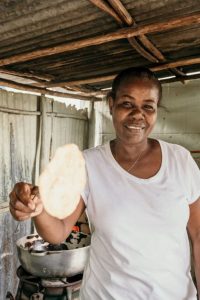 Maria remembers her community as a hopeless place when she was a child. Most of the 500 residents of her batey are descendants of Haitian immigrants working the sugarcane plantations without access to social services, education, or opportunities. When she heard about women taking out loans together with Esperanza, this hard-working single mother recognized an opportunity to provide for her children. With her first loan, Maria opened a small fried food shop, which became the catalyst that finally moved them forward out of poverty.
Maria remembers her community as a hopeless place when she was a child. Most of the 500 residents of her batey are descendants of Haitian immigrants working the sugarcane plantations without access to social services, education, or opportunities. When she heard about women taking out loans together with Esperanza, this hard-working single mother recognized an opportunity to provide for her children. With her first loan, Maria opened a small fried food shop, which became the catalyst that finally moved them forward out of poverty.Microfinance is a banking service which exists to serve the material poor in emerging economies. Through this lending process, loans are distributed to entrepreneurs for investment in their business.
learn more
